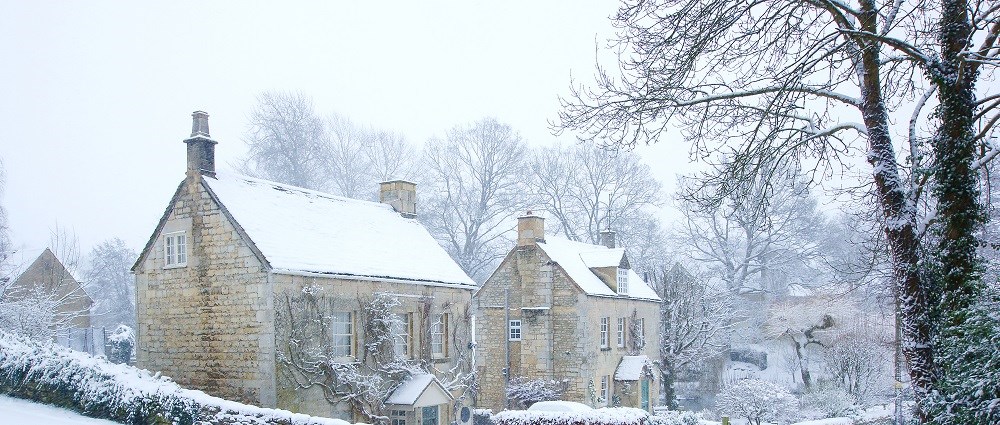Tips to winter-proof your home
Protecting your home during the winter
As the days get shorter and the nights get colder, our homes require a little extra love and care to protect them from freezing temperatures and an increased risk of theft and fire. By carrying out a ‘winter MOT’ on your property, you reduce the risk of a disaster ruining your plans and damaging your belongings, and the risk of costly repairs or making a claim on your insurance.
So what should you be doing to protect yourself and your home this year?
Keep your home cosy inside
During the winter, it’s important to keep your home warm – not only for your health, but to prevent the risk of burst pipes, damp and condensation. The last thing you want is for your boiler to break down just as the cold weather hits. So make sure:
- Your house has proper insulation, especially in the loft
- You insulate any outdoor pipes to prevent freezing
- If your water tank is in the loft, insulate the top and sides but leave the underside clear, so it's warmed by the house below
- In case of a leak, find the stopcock and make sure it can be easily closed
- If you’re going away for a few days, set the thermostat to at least 15°C to prevent frozen pipes. If possible, open the loft hatch to allow warmth to circulate.
- Arrange for your boiler to be serviced at least once a year by a Gas Safe registered plumber.
Protect your home outside
As well as cold temperatures, winter often brings extreme weather conditions, including gale-force winds, torrential rain and snow storms. Keeping a close eye on the exterior of your home can help you spot problems before they become a crisis. To prevent damage to your home, follow these helpful tips:
- Make sure your roof is in good repair – you may be able to check from the ground, otherwise it’s worth getting a professional inspection. Be sure to get any broken or missing tiles fixed or replaced
- Clear your gutters and downpipes, and check for any leaks
- Make sure the roofs of any sheds and outbuildings are in good repair, and doors and windows are secure
- Trim any low-hanging tree branches close to your house
- Make sure there’s nothing outside that might rip free in the wind or damage your property – pack any garden furniture or toys away into the garage
- It’s also useful to check the fastenings on your garden gates, so they don’t come loose and break in storms.
If you make a list of emergency numbers, you won’t be left panicking in a crisis. Include official weather helplines, your insurer’s emergency contact details, and the numbers of nearby friends and relatives who might come and help.
Preparing for a crisis
Unfortunately, our homes are all more susceptible to experiencing a crisis during the winter. There are steps you can take, though, to reduce the risk of theft, fire and flooding.
Burglary
Dark, long nights give intruders easy cover for both planned and spontaneous burglaries. Thankfully, there are some simple ways to deter would-be burglars during the winter:
- Install a burglar alarm from a reputable supplier
- Make sure all your doors and windows are fitted with good quality mortice locks
- Be vigilant – always remember to lock doors and windows
- Don’t leave spare keys under the mat or in plant pots
- Don’t leave window keys in the locks
- Remember to secure garden sheds and garages.
Flooding
Sadly, in the UK we’re more likely to experience torrential rain than a festive sprinkling of snow. If you’re in an area that’s at risk of flooding – you can double check this using the Environment Agency’s dedicated tool – it’s worth taking a few precautions:
- Put together some emergency supplies, including sandbags and your insurance details
- Form a plan for quickly moving valuable or precious items upstairs
- Ring FloodLine for extra advice or go to the National Flood Forum.
Fire
Open flames are more common during the winter than any other season, whether that’s the warmth of a log fire, the soft glow of a candle or celebratory fireworks. To reduce the risk of fire, here are our simple safety recommendations:
- Install smoke detectors in your home and test them regularly
- Never leave an open fire or candles unattended
- If you have an open fire, always use a fireguard, especially when you leave the room
- Invest in fire extinguishers for your home, and make sure you know how to use them
- Use fireworks at a safe distance from your home, following recommendations on the packaging
- Switch off electric blankets before getting into bed.

